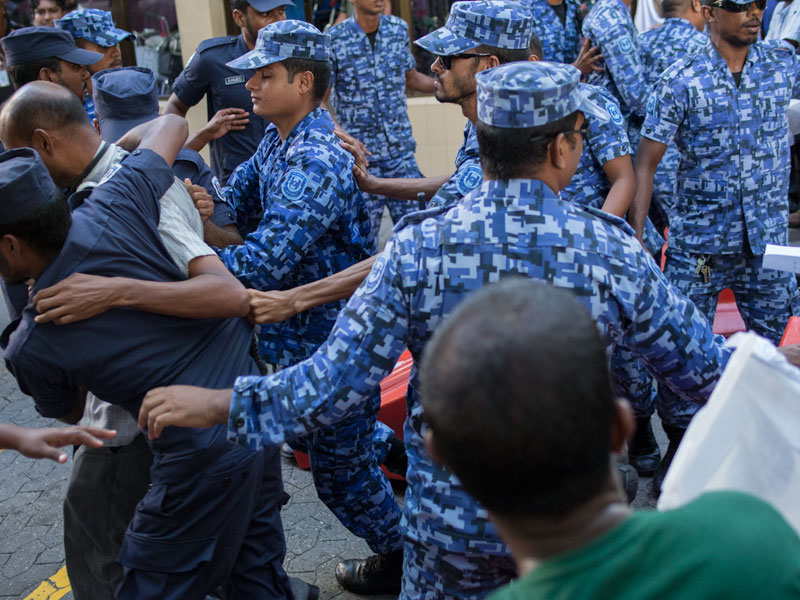Additional reporting by Mariyath Mohamed, Daniel Bosley, Neil Merrett
The Maldivian Democratic Party (MDP) conducted a march around Male’ at 4:00pm after Friday prayers, eventually clashing with police lines at the Salsa Royal intersection on the road to the Supreme Court.
The large column of thousands of demonstrators, including the party’s presidential candidate Mohamed Nasheed and several pick-up trucks with loudspeakers playing party songs, halted at the intersection, waving flags and holding up banners cut to resemble white underpants – a reference to Supreme Court Judge Ali Hameed’s recently leaked sex videos – which has become a motif of the current rallies.
Protesters pushed against the line of police shields and were pepper-sprayed, with those affected – including women – using milk to try and reduce the stinging. Minivan News observed several water bottles thrown into police lines, which bounced off shields and helmets. A video of the protest showed one of the pick-up trucks trying to nudge through police lines.
Several protesters were arrested, including Dhivehi Rayithunge Party (DRP) MP Mohamed ‘Colonel’ Nasheed’, while a Haveeru reporter was taken into custody and released after four hours.
 Police were deployed in riot gear and included Special Operations officers. Maldives National Defence Force (MNDF) officers were stationed further up the street towards the Supreme Court, while all roads leading to the area were blocked to traffic and pedestrians.
Police were deployed in riot gear and included Special Operations officers. Maldives National Defence Force (MNDF) officers were stationed further up the street towards the Supreme Court, while all roads leading to the area were blocked to traffic and pedestrians.
Standing on the back of a pickup truck, MDP MP Imthiyaz Fahmy yelled to the police: “We are rallying to ascertain we, the people, get our constitutional right to vote”.
“Your commissioner Riyaz is unconstitutionally appointed, and all orders from him are unconstitutional. You are not mandated to follow them. Listen to the voice of the people. Let us vote.”
MDP MP Ali Azim yelled: “When we first called for elections, baghees (traitors) said we have a constitution and we would get elections on the date mandated in them. What now? Here’s the mandated date. Where’s our elections?”
“Waheed, Yameen or Gasim, if you have the courage come confront us in an election, we will easily beat you with votes. The truth is you brought a coup d’etat and don’t have the guts to face its consequences,” Azim declared.
“How long can you sit on it and hold off elections? Have it today, tomorrow or in a month, and we will still win. Look at what Waheed got. A measly five percent. A world record for an incumbent president. Five percent is not representative of the state. He should be ashamed to speak on behalf of the people.”
“Please don’t push this country backwards. Give us the rights we are entitled to,” Azim said.
One protester, 25 year-old Ganim Naeem, told Minivan News: “I am not scared. They’ve pepper-sprayed me once today. They can hurt me, but I’m not going home before they agree to let us vote tomorrow.”
A police spokesperson confirmed arrests had been made but was unable to confirm the number or whether pepper spray had been used. One officer was injured, he said.
Seven hours into the protest at 11:00pm approximately 600 protesters remained in the intersection, with many in the front line carrying mirrors they held up to the police officers.
“The Elections Commission has been twisted into calling off the vote by sheer force. The MDP leadership will reconvene and decide what to do. The current protests were not planned – we went on a peaceful march,” said MDP Spokesperson Hamid Abdul Ghafoor.
Around 10:30pm two vans were set ablaze near the Alimas carnival area in Male, which was swiftly brought under control by MNDF firefighters.

